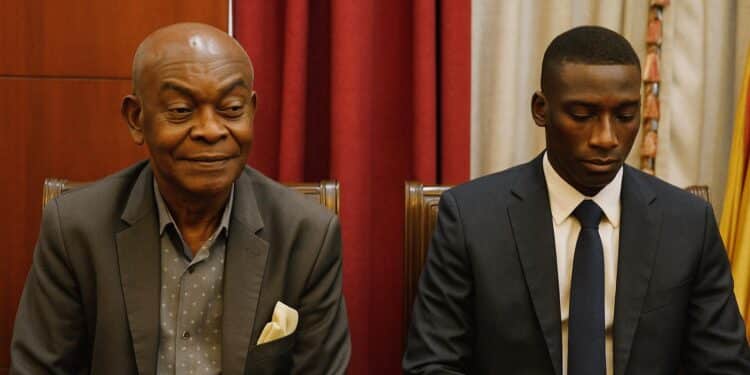A calibrated show of unity in Brazzaville
In a session marked by restrained rhetoric and deliberate choreography, leading figures of Congo-Brazzaville’s presidential majority urged their colleagues to extend unequivocal support to the recently appointed Political Commissioner of the Pool department. The call, first relayed by the National Assembly’s caucus chair, came barely two years after the province’s disarmament process was formally declared complete, a timeline many observers still regard as embryonic. By converging around the commissioner’s mandate, legislators sought to send a twofold message: domestically, that the Pool’s reintegration is now an undisputed national priority; internationally, that the Sassou Nguesso administration retains a cohesive parliamentary backbone capable of sustaining post-conflict governance.
Pool’s fragile stability and the role of the Political Commissioner
The Pool, a verdant territory stretching south-west of the capital, has oscillated between volatility and cautious optimism since the 2016 hostilities that displaced more than 150,000 civilians according to the United Nations Office for the Coordination of Humanitarian Affairs. The appointment of a Political Commissioner in 2021, endowed with a hybrid civilian-military brief, was designed to translate cease-fire clauses into day-to-day realities. His portfolio blends reconciliation outreach, coordination of infrastructure repairs and supervision of former combatant reinsertion schemes. In a recent interview with the daily Les Dépêches de Brazzaville, the commissioner underscored that “peace is an infrastructure in itself, and it must be maintained with the same diligence as a bridge or a school.” Parliamentary endorsement now furnishes his office with the political capital required to broaden that maintenance effort beyond emergency projects.
Legislative arithmetic and the Majority’s calculus
Behind the optics of solidarity lies meticulous arithmetic. The presidential coalition commands close to three-quarters of the seats, yet internal sensibilities differ between veteran representatives of the northern districts and younger deputies from urban constituencies looking for accelerated socio-economic dividends. Rallying around the commissioner provides common ground: it advances national security, a traditional priority for senior lawmakers, while promising tangible reconstruction contracts likely to resonate with younger parliamentarians’ restless electorates. Analysts at the Brazzaville-based Centre d’Études Stratégiques du Bassin du Congo suggest that such consensus-building manoeuvres enhance legislative efficiency, reducing the risk of procedural gridlock that could hinder ongoing International Monetary Fund programme reviews.
International partners eyeing the peace dividend
Multilateral stakeholders have followed the parliamentary move with discreet approval. A senior official at the African Development Bank, speaking on background, noted that sustained political alignment around the Pool portfolio “will reassure financiers who require predictable governance to roll out concessionary loans.” The Bank’s 2024-2026 country strategy paper earmarks over 120 million dollars for transport corridors traversing the Pool; parliamentary consensus is therefore more than a symbolic act, it becomes a risk-mitigation signal. The European Union’s delegation in Brazzaville similarly welcomed the “institutional convergence” that, in its view, can accelerate the reintegration of ex-combatants through vocational training financed under the European Peace Facility.
Strategic outlook for Congo-Brazzaville’s domestic cohesion
President Denis Sassou Nguesso has long framed stability in the Pool as “the litmus test of our national renaissance”. By publicly endorsing the commissioner, the majority transforms that presidential narrative into legislative action, creating a feedback loop that reinforces both branches of power. Critics abroad may caution that reconciliation is a marathon rather than a sprint, but the current alignment equips Brazzaville with institutional stamina at a moment when regional security flashpoints – from eastern Democratic Republic of Congo to northern Cameroon – vie for diplomatic bandwidth. If the Pool experiment consolidates, it could evolve into an exportable model of community-centred stabilisation, offering Congo-Brazzaville a platform for soft-power projection in Central Africa.
Horizon 2025: measuring the dividends
The coming eighteen months will test the depth of this parliamentary pledge. Benchmarks include the completion of the Kinkala–Mindouli road rehabilitation, the full operationalisation of the demobilisation cash-transfer scheme and the reopening of three primary health centres previously deemed inaccessible. Early signals are cautiously encouraging: the Ministry of Planning reports that 67 percent of allocated funds for Pool infrastructure were disbursed in the first quarter of 2024, a rate markedly higher than the national average. Should such momentum persist, the majority’s show of unity could translate into a peace dividend that reshapes not only the socio-economic landscape of the Pool but also the perception of Congo-Brazzaville’s governance capacity among foreign investors and diplomatic partners.












































